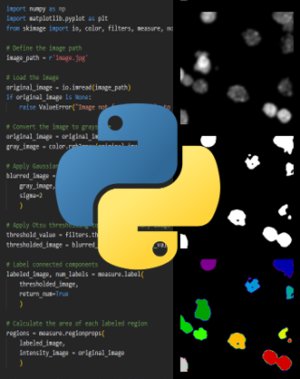Course Info
While the skills learned during the course will have broad applications (data analysis, plotting, scripting...), the focus of exercises will be on image analysis and processing topics. Prior knowledge of digital imaging is helpful but not required.
This course is structured in two parts:
Applicants may register for either part or both.
Covered topics:
- Introductory sessions aimed at installing and familiarizing participants with Conda, Python, and Jupyter Notebook.
- Fundamentals of Python syntax.
- Image operations and image processing techniques in Python utilizing essential libraries.
- AI-based tools for image processing and analysis.
- Workflows and batch analysis for efficient processing of multiple images and data sets.
- Image visualization in Napari.
- Data analysis and visualization using libraries such as Pandas, Seaborn and Matplotlib.
February 12-13 + 16-17, 2026
BIOCEV, Vestec
The course is organized by the Imaging Methods Core Facility.
The course is supported by the National Infrastructure for Biological and Medical Imaging (Czech-BioImaging, Ministry of Education, Youth and Sports – Large Research Infrastructure, LM2023050).
